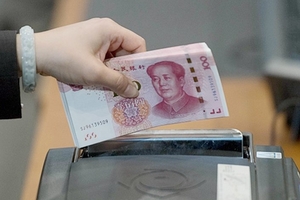Chart of the Day: Overseas Investors Flock to China’s Bond Market
Foreign holdings of bonds traded in China’s interbank market hit a record high in December, as global investors were lured by relatively high yields, expectations of continued yuan appreciation, and the strong recovery in the world’s second-biggest economy from the Covid-19 pandemic.
Outstanding overseas holdings of interbank bonds rose to a total of 3.25 trillion yuan ($503 billion) at the end of December, a net increase of 1.1 trillion yuan from a year earlier, according to data from China Central Depository and Clearing Co. Ltd. (CCDC) (link in Chinese) and the Shanghai Clearing House (link in Chinese).
 |
Foreign holdings of Chinese bonds, mostly in the form of government debt, have almost tripled since the end of 2017 when they stood at just 1.15 trillion yuan and accounted for 1.55% of the overall bond market. But even at their current level, they represent just 2.7% of the total market which was valued at 115.7 trillion yuan at the end of November, according to central bank data (link in Chinese).
China now has the world’s second-biggest bond market which is dominated by the interbank market where most central and local government debt and corporate bonds are sold and traded. Foreign institutional investors piled in last year as regulators further opened up the market and made it easier for them to trade. More measures are in the pipeline: in September, the central bank and other financial regulators unveiled proposals to simplify application procedures for foreign bond investors and unify rules governing the various investment channels open to them.
In addition to expanding the ways investors can access the market, regulators have also removed quota restrictions and relaxed capital constraints, analysts at China Merchants Securities Co. Ltd. (CMSC) wrote in a report (link in Chinese) last month.
Read more
In Depth: What’s Next for the Yuan After Crushing the Dollar for Six Months
Foreign investment has also been fueled by the decisions of three major global index providers — Bloomberg, JPMorgan Chase & Co. and FTSE Russell — to add Chinese government bonds (CGBs) to their flagship indexes, moves widely expected to drive a significant influx of capital.
The confidence of foreign investors has been given a further boost by China’s recovery from the Covid-19 pandemic and by the government’s economic policies. Policymakers steered clear of the massive fiscal stimulus rolled out by many other major economies and avoided implementing an excessively loose monetary policy and slashing interest rates. As a result, China’s benchmark interest rates and bond yields have remained far higher than in most other major economies, luring yield-hungry global investors.
The yield on 10-year U.S. Treasury securities fell from around 1.9% at the end of December 2019 to as low as 0.54% in March 2020 although it rebounded to just over 0.9% by the end of December, data from CCDC show. In contrast, the yield on 10-year CGBs, which stood at around 3.1% to 3.2% at the end of December 2019, slumped to as low as 2.48% in April 2020 before recovering to around 3.15% by the end of the year. The gap of more than 200 basis points and expectations of yuan appreciation against the U.S. dollar have made CGBs an attractive option for foreign investors.
Analysts at some international financial institutions forecast overseas demand for Chinese bonds will remain strong in 2021.
In a recent report (link in Chinese) on the outlook for Chinese markets in 2021, global asset management giant Fidelity International Ltd. said the yield differential between CGBs and government bonds of other major economies including the U.S. and Europe, and the inclusion of CGBs in the benchmark indexes of global bond index providers will continue to spur investors to add Chinese bonds to their portfolios.
The CMSC analysts expect foreign investors to increase their holdings of yuan-denominated bonds by 900 billion yuan in 2021, less than in 2020. They forecast the yield spread will narrow to around 200 basis points from a record high of over 230 basis points last year, which will make CGBs less attractive, although the continued opening up of the market will still attract inflows from overseas, they wrote.
Contact reporter Luo Meihan (meihanluo@caixin.com) and editor Nerys Avery (nerysavery@caixin.com)
Download our app to receive breaking news alerts and read the news on the go.
- PODCAST
- MOST POPULAR






